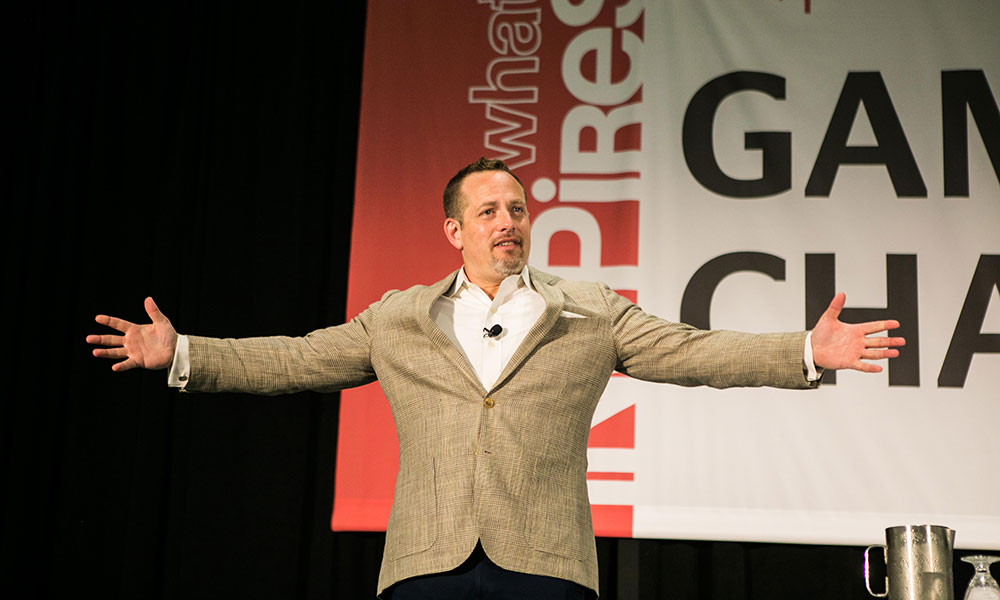
#ASAE17: Find Your Positive Passion
During his Game Changer session at ASAE’s Annual Meeting, performance coach Daniel Lerner told attendees to bring success and happiness together by choosing harmony over obsession.
They say it’s possible to have too much of a good thing—too much sugar, too much free time, too much information. Passion can be like that. While passion drives people to succeed, it also can lead to spectacular personal failures and generally unhappy lives.
If you need evidence for that, Daniel Lerner can provide it, from both scholarly research and real-life anecdote. Lerner—a performance coach who works with high-potential musicians, athletes, and executives and who teaches New York University’s most popular elective course, “The Science of Happiness”—can tick off the names of familiar high achievers (Steve Jobs, Kanye West, Bobby Knight) who don’t exactly summon up a picture of stability and well-being.
“Happiness and success don’t always go together the way we expect,” Lerner told ASAE Annual Meeting & Exposition attendees at Monday morning’s Game Changer session, “Balanced Obsession: The Science of Happiness and Success.”
A former agent to musicians and opera singers, Lerner observed over time a stark difference between clients who were happy and fulfilled in their lives onstage and off and others who were miserable despite their professional success. “I saw this going on and I thought, I need to understand what’s going on psychologically with these enormously successful people,” he says. “So I left the business with one question: Where do success and happiness coexist?”
The most recent research on that question points to a powerful factor—passion, which, Lerner notes, can be a force for good or ill. “When we talk about success and happiness, [the research shows] there are two very different kinds of passion. One is harmonious passion, which blends into your life with great harmony, and the other is obsessive passion, and it’s not something you necessarily want in your life.”
Harmonious passion generates activity for the simple love of it, he says, while people pursue obsessive passions to please others or for status, glory, or money. A harmonious passion is a part of a person’s life, while an obsessive passion is a person’s whole life. People with harmonious passions are motivated to learn, while those with obsessive passions are driven to win at all costs and believe that “you are the best, or you are nothing,” Lerner says.
The outcomes are predictable: People with obsessive passions experience more negative emotions, engage in more self-destructive behaviors, and are more likely to burn out, according to research. “And here’s the kicker,” Lerner adds. “We tend to think that we need to be obsessive to be great,” but the two types of passion create “an equal likelihood of mastery.”
That means you have a choice, he says. If your passions are obsessive, you can change course.
“Maybe you want to see your family more often, twice or three times a week. Make a non-negotiable agreement with yourself that you will get home early to have dinner with your family—or exercise, or meditate, or whatever it is you’re looking to do. You will feel guilty, I guarantee, leaving your obsessive passion. But once you’ve done it, take five minutes to journal on it. Why is this something that I’m grateful for? Once you do that, you start to make that jump, and you start to understand what it is that’s actually important to you.”
And if you think you have the opposite problem—that you don’t have a passion at all—you’re probably wrong, Lerner says. Researchers have defined passion as “an intense desire or enthusiasm for something” that a person does or wants to do at least 8.5 hours a day. And that doesn’t necessarily mean work.
“Passions are not thunderbolt moments. The vast majority of us think we know a passion when we see it. But passions tent to take about three years to develop on average. It starts with a spark. It starts with you seeing something you’re interested in” and starting to explore. “It’s a slow build,” he says.
“If you have one harmonious passion in life—let’s say it’s not the work you do, let’s say its gardening or tennis or baseball—as long as you’re getting that in on a regular basis, you are far more likely to start nurturing harmonious passion in other aspects of your life.”
Performance coach Daniel Lerner. (Photo by Jennifer Roberts)






Comments